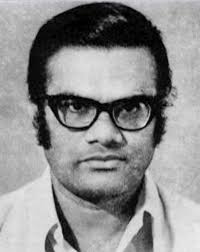Alamgir Kabir (film maker) facts for kids
Quick facts for kids
Alamgir Kabir
|
|
|---|---|
 |
|
| Born | 26 December 1938 Rangamati, Bengal Presidency, British India
|
| Died | 20 January 1989 (aged 50) Pabna, Bangladesh
|
| Alma mater |
|
| Occupation | film maker |
| Spouse(s) | Monjura Ibrahim (1968-1975; divorced) Jayasree Kabir (1975-1989; death) |
| Children | 3 |
| Awards | Independence Day Award (2010) |
Alamgir Kabir (born December 26, 1938 – died January 20, 1989) was a famous Bangladeshi film director and a person who worked to promote culture. Three of his movies are listed among the "Top 10 Bangladeshi Films" by the British Film Institute.
Contents
Early Life and Education
Alamgir Kabir was born on December 26, 1938, in Rangamati. His family originally came from Banaripara Upazila in the Barisal area. He finished his high school studies in 1952 at Dhaka Collegiate School. Then, he completed his college studies in 1954 at Dhaka College. After earning his bachelor's degree in physics from the Dhaka University, he went to England. At age 22, he went to Oxford University to study electrical engineering.
Becoming a Filmmaker
While studying at Oxford University, Alamgir Kabir watched a movie called The Seventh Seal by Ingmar Bergman many times. This movie made him very interested in filmmaking. He then took several courses at the British Film Institute. These courses taught him about the history of movies, how to direct films, and the art of filmmaking.
He also became involved with a political group in England and worked as a reporter for their newspaper, the Daily Worker. In the early 1960s, Alamgir traveled to Cuba. As a reporter, he even interviewed Cuban President Fidel Castro. He also supported freedom movements in other countries like Palestine and Algeria. Alamgir helped start groups like East Pakistan House and East Bengal Liberation Front in London. He also worked to fight against unfair treatment based on race.
In 1966, Alamgir Kabir returned to Dhaka. The government at that time put him in prison because of his involvement with political movements. Later, he started working as a journalist. When the war for independence began in 1971, he joined Swadhin Bangla Betar Kendra. This was a radio station that supported the independence movement. He was the head of its English section. He also worked as the main reporter for the Bangladeshi government that was in exile. During this time, he started directing films by making documentaries.
After Bangladesh gained independence, he began making feature films. These are the longer, story-based movies we usually think of. From 1981 to 1982, Alamgir helped organize film appreciation courses. These courses were for people who wanted to learn more about movies.
Sadly, Alamgir Kabir drowned on January 20, 1989. This happened in the Jamuna River when he was returning from a film seminar.
Films by Alamgir Kabir
Alamgir Kabir directed many films, both long feature films and shorter ones.
Feature Films
- Dhire Bohe Meghna (1973)
- Surjo Konna (Daughter of The Sun), 1975
- Simana Periye (Across The Fringe), 1977
- Rupali Saikate (The Loner), 1979
- Mohana (The Mouth of a River), 1983
- Mahanayak (The Great Hero), 1985
- Parinita (The Wedded), 1984
Short Films
- Liberation Fighter
- Pogrom in Bangladesh
- Culture in Bangladesh
- Sufia, Amulya Dhan (The Invaluable)
- Bhor Halo Dor Kholo (Open the Door now at the Dawn)
- Amra Dujan (The Two of Us)
- Ek Sagar Rakter Binimoye (At the Cost of a Sea of Blood)
- Manikanchan (The Diamond)
- Chorasrot (The Unseen Trend)
Awards and Recognition
Alamgir Kabir received several awards for his work in filmmaking:
- National Film Award for best Dialogue - 1977
- Cine Journalists Award
- Zahir Raihan Film Award of Uttaran
- Syed Mohammad Parvez Award
- Independence Day Award (2010)
Family Life
Alamgir Kabir married Manjura Begum in 1968. After they separated, he married actress Jayasree Kabir in 1975. He had three children: two daughters named Elora and Ajanta, and a son named Lenin Saurav Kabir.

